新概念英语2_第一课
新概念英语2 Lesson1课件(共60张PPT)

Seatbelt = safety belt
• Fasten your seatbelt, please!
单词表示抽象概念:
席位
• Win a seat in the congress 赢得一个议会席位 • Lose a seat in the congress 丢掉一个议会席位
☆attention n.注意
Last week, I went to the theatre. • 去看戏
• 注意拼写规则: • theatre (Br)= theater (US) • centre = center • metre = meter
Last week I went to the theatre. 译: 上星期我去看戏。 go to the +地点 表示去某地做什么 go to the theatre = go to the theatre to see a play去剧场看戏 go to the cinema =see a film去电影院看电影
I had a very good seat. The play was very interesting. I did not enjoy it. 我的座位很好戏很有意思无法欣赏。
interesting adj .引起兴趣的,有趣的 eg: This man is very interesting. The book is so interesting that I do not want to put it down. interested adj. .对…感兴趣的 be interested in sth/ doing sth eg. I am interested in sports. Professor Qiao is very interested in collecting stamps. enjoy v.享受…之乐,欣赏,喜爱 enjoy doing sth enjoy swimming 喜欢游泳。 How did you enjoy your trip 旅行如何? enjoy one's dinner 饭吃得津津有味。
新概念英语2第一课

★Business n. 事 Business man :生意人 生意人 do Business: 做生意 go to some place on Business: 因公出差 I went to Tianjin on Business. thing可以指事情 也可以指东西 可以指事情,也可以指东西 可以指事情 It's my business 私人事情 It's none of your business. 无礼地, ★rudely adv. 无礼地,粗鲁地 rude adj.
★private adj.私人的 (personal) A private conversation 私人谈话 A private company 私有公司 A private life 私生活 A private school 私立学校 It‘s my private letter/house. (反)public:公众的,公开的 public letter 公开信 public place :公共场所 privacy:隐私 It‘s a privacy. 《Saving Private Ryan》 private soldier: 大兵 private citizen 普通公民
I had a very good seat.
I had a very good seat =I was sitting in a good place; maybe I was sitting in the front of the theatre.
The play was very interesting .
In the end, I could not bear it.
In the end 最后 as a result ; at last ; eventually ; finally in the end ; as a result 强调结果 at last ; eventually 强调经历艰难过程之 后最终。。。 eg. We have arrived at last. finally 强调次序
新概念英语2第一课
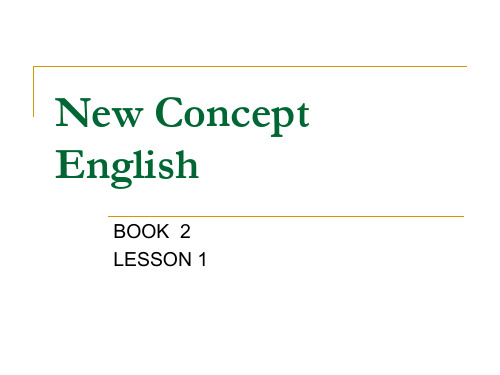
attention n. 注意
Attention ,please. 请注意(口语) pay attention 注意 pay attention to … 对……注意 You must pay attention to that girl.
pay a little attention 稍加注意 pay much attention 多加注意 pay more attention 更多注意 pay no attention 不用注意 pay close attention 特别注意
theatre n.剧场, 戏剧
(1) 去看戏:go to the theatre (2) cinema n.电影院 seat n.座位 take a seat/take your seat 坐下来 sit down 坐下;be seated=take a seat 就坐
Sit ห้องสมุดไป่ตู้ seat作为动词的区别
angry adj. 生气的 副词形式:angrily adv. 生气地 be angry with sb./at/about sth be cross with sb. /about sth
生气的程度
程 I was annoyed. 度 I was angry/cross. 加 I was very angry. 深 be blue in the face : I am blue in the face.(脸色都青了, 相当生气了)
11. The writer could not bear it . He could not ___ it. a. carry b. suffer c. stand d. lift 12. The young man spoke rudely. He wasn‟t very ___. a. clever b. rude c. polite d. kind
新概念英语第二册 第一课(共22张PPT)

12. It’s none of your business. 关你屁事;这不关你的事。
class.上课期间你要专心听老师讲课。 15. ___I_n__th__e__e_n_d____they reached a place of safety.
他们终于到达了一个安全的地方。
16. Peter and Tom made up __in___th__e__e_n_d____.
彼特和汤姆最后和解了。 17. The shelf, too weak to ___b__e_a_r___all the books,
14. private ['praɪvət] adj. 私人的;个人的;私下的;私有的
The president is paying a private visit to Europe. 总统正在欧洲进行私人访问。 We each have our private views about it. 我们每个人对这件事都有自己的看法。
关你屁事;这不关你的事。 13. __r_u_d__e_l_y_ adv. 无礼地;粗暴地 14. __p__ri_v_a_t_e__ly___ adj. 私人的;个人的;
私下的;私有的 15. __c_o__n_v_e_r_s_a__ti_o_n_ n. 谈话;会话
Step 2 在语境中加深对词汇短语的理解与记忆,掌握其具体用法。 1. theatre [ˈθiːətər] n. 电影院,戏院;戏剧
新概念英语第二册Lesson1课件
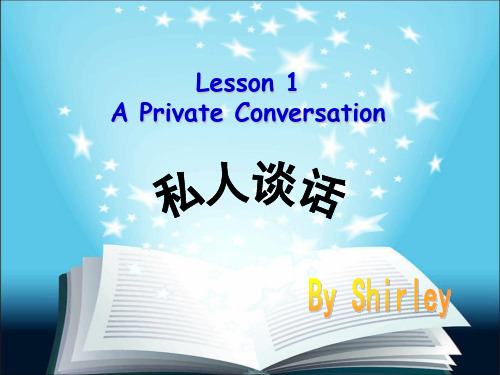
I could not hear the actors.
Key structures and usage
过去进行时:过去某个时间正在进行 或发生的动作 A young and a young woman were sitting behind me.
They were talking loudly.
• • • • • • • • • • • • • • •
【Key structures】 简单陈述句的语序 陈述句一定是有主语,有动词,有宾语,有句号 6 1 2 3 4 5 6 when? Who? Action Who? How? Where? When? Which? Which? What? What? 1 ---主语,一般由名词、代词或名词短语构成,通常位于动词之前,动词必 须与主语一致,即主语决定动词的单复数形式 2 ---谓语,由动词充当 3 ---宾语,一般为名词、代词或名词短语 4 ---副词或介词短语,对方式或状态提问,往往做状语 I like her very much 5 ---地点状语,一般在方式副词之后,时间副词之前 6 ---时间状语,可以放在句首或句末 简单陈述句一定不能少的是主语, 谓语. 如果问何时何地,是一个固定搭配 when and where
• • • • • •
★business n. 事, 生意 ① n. 生意 business man :生意人 do business: 做生意 ② n. 某人自己的私人的事情 It's my business. (指私人的事, 自己处理的 事) • It's none of your business. 不关你的事。
Language points
以下短语中名词前不加冠词:
新概念英语2书上习题答案

新概念英语2书上习题答案新概念英语2书上习题答案新概念英语2是许多学习英语的人所熟悉的一本教材。
它以其简洁明了的语言和丰富多样的习题,帮助学习者提高英语水平。
然而,对于一些学习者来说,习题的答案并不总是那么容易找到。
在这篇文章中,我将为大家提供一些新概念英语2书上习题的答案,希望能够帮助大家更好地学习和掌握英语。
第一课:A private conversation1. 1. Yes, he does.2. No, he doesn't.3. Yes, he does.4. Yes, he does.2. 1. I'm from Brazil.2. I'm from Japan.3. I'm from France.4. I'm from Italy.第二课:Breakfast or lunch?1. 1. Yes, they are.2. No, they aren't.3. No, it isn't.4. Yes, they are.2. 1. I'd like a cup of tea, please.2. I'd like a glass of orange juice, please.3. I'd like a bowl of cereal, please.4. I'd like a plate of eggs and bacon, please. 第三课:Please send me a card1. 1. She's in New York.2. She's in Paris.3. She's in London.4. She's in Rome.2. 1. Yes, he did.2. No, he didn't.3. Yes, she did.4. No, she didn't.第四课:An exciting trip1. 1. They went to the countryside.2. They went to the mountains.3. They went to the beach.4. They went to the city.2. 1. They took a train.2. They took a plane.3. They took a bus.4. They took a car.第五课:We're going to travel1. 1. They're going to the United States.2. They're going to China.3. They're going to Australia.4. They're going to Canada.2. 1. They're going to visit famous landmarks.2. They're going to try local cuisine.3. They're going to explore the natural beauty.4. They're going to learn about the local culture.通过以上习题的答案,我们可以更好地理解和掌握新概念英语2的内容。
新概念第二册第一课

nothing.
see:看见,强调结果; look:看,动作; watch:长时间关注,尤其是活动的物体 I had dinner and watched TV for several hours. He spent the entire afternoon watching a football match.
★attention n. 注意
pay attention 注意
pay no attention
a little much more close
0% 20% 40% 60% 80% 100%
interest
n.兴趣, 利息 vt.使发生兴趣, 引起...的注意 interesting adj.有趣味的,修饰物 interested adj. .感兴趣的,修饰人 be interested in sth./doing sth.
★bear (bore, born) v. 容忍
How can you bear living in this place? 你怎么能受得了住在这个地方?
Who will bear the cost? 谁来承担这笔费用? put up with
stand
bear
★business n. 事, 生意
public public public public 公共的 school公立学校 letter 公开信; place 公共场所
★conversation n.谈话
have a talk
have a chat have a dialogue
内容可正式可不正式
闲聊 ,侃大山 对话, 可以指正式国 家与国家会谈
enjoy
enjoy sth 享受 enjoy doing 热衷于 enjoy oneself=have a good time 享受生活/阳光 热衷于大声讲英语/读书
新概念英语第二册第一课
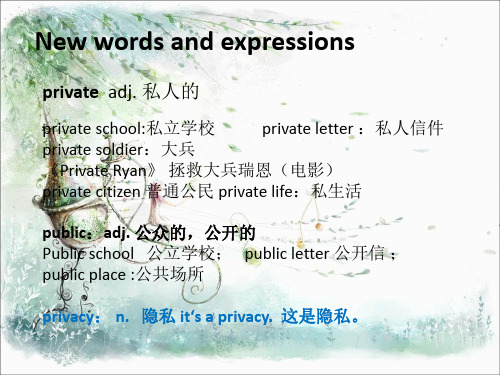
go to + 人’s 表示去这个人开的店或者某人家
go to the doctor’s 去看医生 go to the butcher’s 去买肉 go to the Sally’s 去Sally家
enjoy + sth. 喜欢;从中得到一种享受
eg. I enjoy the class/music/book/movie. enjoy yourself/ have fun: 玩的开心
attract/ draw attention 吸引注意 eg.
Films with stars always attract great attention .
As the youngest child, she was always the center of attention.
bear : (bore , borne) v. 容忍
Let’s get down to our business. 让我们言归正传。
Note on the text
go to the theatre 去戏院
go to + place(地点) 表示去某地干什么
go to the hospital 去医院看病
go to school
去上学
go to the cinema 去看电影
turn round = turn around 转身
turn sb. away : 拒绝,(戏院,电影院等)不让进。
turn back 掉头,折回 turn back the clock 重归于好,倒退 turn on/ off 打开/关掉 turn into 变成 turn sb./sth. into sb. In a flash light, the prince turned into a frog.
新概念英语2第1课

LESSON 1
A private conversation
Don’t flatter yourself. 奉承
别自作多情。
private
私人的 ◎ a private car ◎ private property 私人财产
A private conversation
Last
week I went to the theatre. I had a very good seat. The play was very interesting. I did not enjoy it. A young man and a young woman were sitting behind me.
9 Did you get angry with them or not? (Yes, I did.)
10 You turned round, didn't you? (Yes, I did.)
11 How did you look at them? (Angrily.)
12 They didn't pay any attention, did they? (No, they didn't.)
TV
loud ly
The
boy is reading loudly.
angry
angrily
“GoThey away!” he said angrily. are very angry.
attention
注意 Attention!
立正!
bear bore borne 容忍 I can’t bear it.
新概念二第一课(共23张PPT)
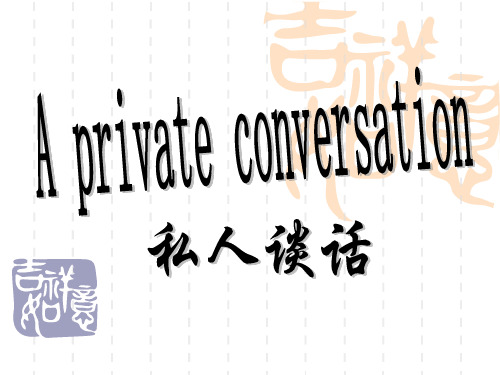
PS:时间状语可以置于开头 例:I read books carefully in
the library yesterday morning. = Yesterday morning, I read
books carefully in the library.
8.My job is repairing cars.(动名词做 表语)
9.The question is what you want to do.(从句做表语,即:表语从句)
二、主语———谓语 在这一句型中,动词为 不及物动词及不及物的动词词组。在有的 句子中,不及物动词可以有状语修饰。
1.The sun is rising. 2.I'll try. 3.Did you sleep well?(well做状语,修饰不
句型分析:
7.They did not pay any attention. 析: pay attention to sth/sb pay no attention to ..没有注意 8.It’s none of your business. 析:固定语法---不关你事!
本课语法—简单陈述句的语序
5.What do you want me to do?(不定式做宾补)
6.We thought him to be an honest man.(to be 做宾补)
7.He believed them to have discussed the problem.(不定式的完成式做宾补)
8.He believed her to be telling the truth.(不定 式的进行式做宾补)
新概念英语二 第一课 第一课时
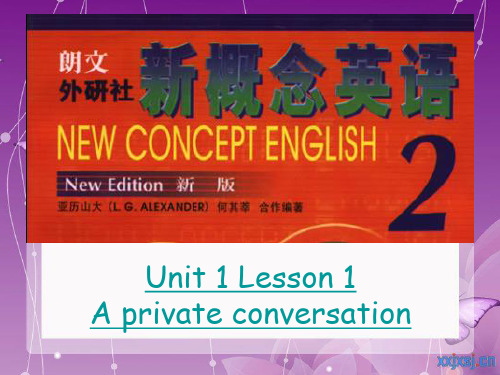
Listening
• Listen to the story and see if you can answer this question: Why did the writer complain to the people behind him? Because they were talking so that he could not hear the actors.
6.Could you hear what the actors were saying? •They were talking loudly. 7.Why couldn't you hear? •Talking loudly. 8.What were they doing? 9.Did you get angry with them or not? •Yes, I did.
Asking questions
5.Ask me if I turned round. Did you turn round? What...do? What did you do? 6. Ask me if I looked at the young man and the young woman angrily. Did you look at the young man and the young woman angrily? How...? How did you look at the young man and the young woman?
新概念英语第二册第1课-A private conversation
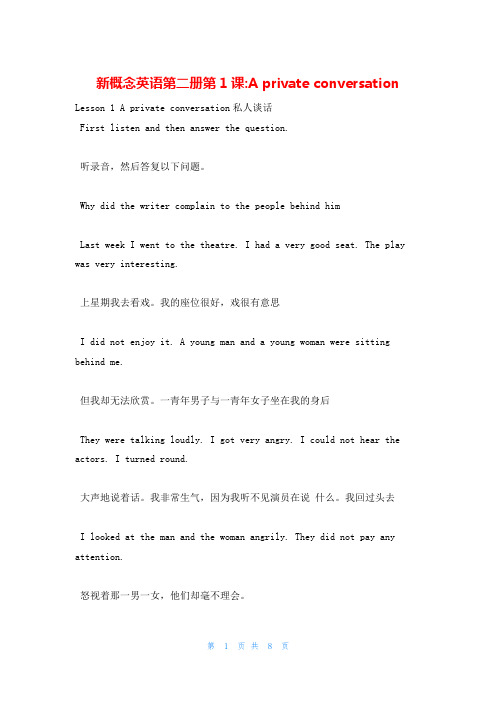
新概念英语第二册第1课:A private conversation Lesson 1 A private conversation私人谈话First listen and then answer the question.听录音,然后答复以下问题。
Why did the writer complain to the people behind himLast week I went to the theatre. I had a very good seat. The play was very interesting.上星期我去看戏。
我的座位很好,戏很有意思I did not enjoy it. A young man and a young woman were sitting behind me.但我却无法欣赏。
一青年男子与一青年女子坐在我的身后They were talking loudly. I got very angry. I could not hear the actors. I turned round.大声地说着话。
我非常生气,因为我听不见演员在说什么。
我回过头去I looked at the man and the woman angrily. They did not pay any attention.怒视着那一男一女,他们却毫不理会。
In the end, I could not bear it. I turned round again. I can t hear a word! I said angrily.最后,我忍不住了,又一次回过头去,生气地说:“我一个字也听不见了!〞It s none of your business, the young man said rudely. This is a private conversation!“不关你的事,〞那男的毫不客气地说,“这是私人间的谈话!〞New words and expressions 生词和短语private(title)adj. 私人的angryadj. 生气的conversationn. 谈话angrilyadv. 生气地theatren. 剧场,戏院attentionn. 注意seatn. 座位bear(bore, borne) v. 容忍playn. 戏businessn. 事loudlyadv. 大声地rudelyadv. 无礼地,粗鲁地Notes on the text课文注释1 go to the theatre,去看戏。
新概念英语第二册第一课(包含课文、练习及答案)
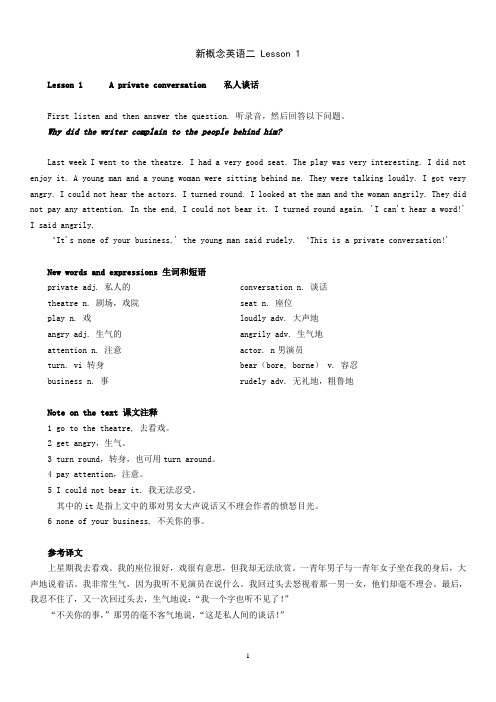
新概念英语二 Lesson 1Lesson 1 A private conversation 私人谈话First listen and then answer the question. 听录音,然后回答以下问题。
Why did the writer complain to the people behind him?Last week I went to the theatre. I had a very good seat. The play was very interesting. I did not enjoy it. A young man and a young woman were sitting behind me. They were talking loudly. I got very angry. I could not hear the actors. I turned round. I looked at the man and the woman angrily. They did not pay any attention. In the end, I could not bear it. I turned round again. 'I can't hear a word!' I said angrily.‘It's none of your business,' the young man said rudely. ‘This is a private conversation!'New words and expressions 生词和短语private adj. 私人的 conversation n. 谈话theatre n. 剧场,戏院 seat n. 座位play n. 戏 loudly adv. 大声地angry adj. 生气的 angrily adv. 生气地attention n. 注意 actor. n男演员turn. vi 转身 bear(bore, borne) v. 容忍business n. 事 rudely adv. 无礼地,粗鲁地Note on the text 课文注释1 go to the theatre, 去看戏。
新概念英语第二册 Lesson1 课件
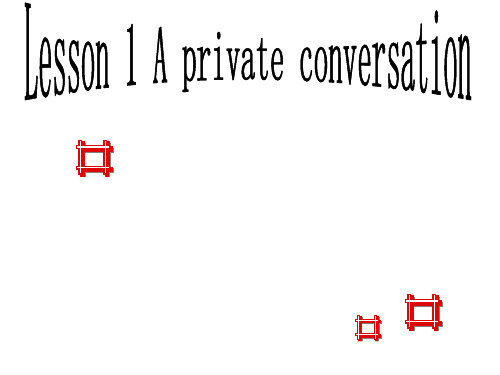
• ★conversation n.谈话(非正式的) They are having a conversation about their holiday.
谈论某事 They are having a conversation with their father.
和某人谈话 talk: 可正式也可为非正式的私聊 dialogue:对话,公谈(正式) China and Korea are having a dialogue.
• ★bear(bore,borne) v. 容忍 • stand v. 容忍
在否定句或疑问句中常与can/could连用 eg: I can't bear/stand you! 我姐姐忍受不了房间里有老鼠! My sister can't bear/stand mouse in the house!
★attention n. 注意 Attention, please. 请注意 Attention! 立正!
• pay attention to : 对什么注意 • You must pay attention to the book. • pay more attention :稍加注意
• ★bear n. 熊 polar bear 北极熊
• It's none of your business. =None of your business =It's my business.
Text
• go to the +地点 表示去某地干什么事 • go to the theatre
= go to the theatre to see a play去剧场看 戏 • go to the cinema =see a film 去电影院看电影
新概念二第一课(共22张PPT)

go to the theatre: 去看戏
① go to the +地点:去某地干嘛
Eg:go to the hospital (不是去看病,可以是去看病人)
['biznis]
n.事
12 rudely ,粗鲁地
['ru:dli]
ad.无礼地
Private
① adj. 私人的; 反义词:public (公共的) public school 公立学校
private school 私立学校 privacy n. 隐私 It’s my privacy.
本课的语法点是:简单陈述句的语序 语序(when)+主语+ 谓语+ 宾语+how+where+when
如果时间和地点连在一起:
先放地点再放时间,即where+ when
Eg: He went to the theatre last night.
如果问何时何地,是一个固定搭配: when and where
4 seat
[si:t]
n.座位
5 play
[plei]
n.戏
6 loudly
['laudli]
ad.大声地
7 angry
['æ ŋgri]
a.生气的
8 angrily
['æ ŋgrili]
ad.生气地
9 attention
新概念英语第二册 第1课 (共19张PPT)

get 是逐渐变得的意思,接近become e.g. During the night, it got terribly cold.
4. I couldn’t hear the actor.
hear sb. 听见某人说话 hear from sb. 收到某人来信 hear of sb./sth. 知道某人(某事) hear about sth. 听说、得悉某消息 e.g. I can’t hear you.
summary writing.
1、where did the writer go last week? 2、did he enjoy the play or not? 3、who was sitting behind him? 4、were they talking loudly ,or they talking quietly ? 5、could the writer hear the actors or not? 6、did he turn around or not? 7、what did he say? 8、did the young man say ,“the play is not interesting”or did he say ,“this is a private conversation”?
New words
private
adj.私人的 personal. a private company; private life
conversation
n.谈话 talk have a conversation with sb. e.g. I had a quiet conversation with my closest friend. v. converse交谈
新概念英语第二册 第一课 Lesson01 a private conversation
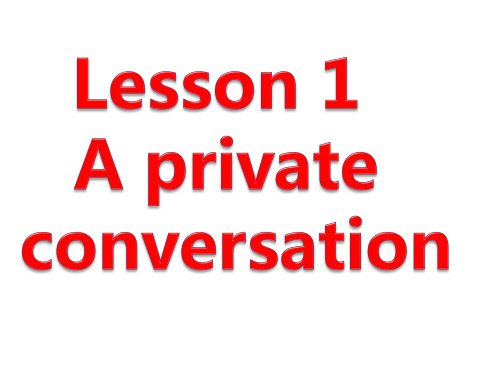
a bear hug 热烈的拥抱 bear 熊
★ business n. 事, 生意
① n. 生意 business man : 生意人 do business: 做生意 on business: 因公出差
② n. 某人自己的私人的事情 It's my business. (指私人的事, 自己处理) It‘s none of your business. 不关你的事。 Mind your own business. 管好自己的事 情。
• seat n.座位 Please take/have
a seat. 请坐下.
Is the seat taken? 这座位有人坐吗?
打篮球 弹钢琴
play n. 戏 看戏 see a play
play v. 打(球),弹奏
play basketball
play the piano
loudly adv. 大声地 现在他们正在大声讲话。
3. The play was very interesting.
interesting adj.
• ---ing 令人… 的 • ---ed 自己感到… 的 • This book is interesting. 书有趣 • be interested in… 对……感兴趣
interest n. 兴趣 have interest in… 对…感兴趣
Words of lesson 1
public theatre
private
conversation
play
angry
angrily
seat
attention
bபைடு நூலகம்siness
stand
新概念英语第二册第一课

Last week I went to the theatre. I had a very good seat. The play was very interesting. I did not enjoy it. A young man and a young woman were sitting behind me. They were talking loudly. I got very angry. I could not hear the actors. I turned round. I looked at the man and the woman angrily. They did not pay any attention. In the end, I could not bear it. I turned round again. 'I can't hear a word!' I said angrily. 'It's none of your business,' the young man said rudely. 'This is a private conversation!'.
3. The play was very interesting. I did not enjoy it.戏很有意思,但我却无法欣赏。
interesting adj .引起兴趣的,有趣的(修饰物)
Eg : This man is very interesting. The book is so interesting that I do not want to put it down.
New
- 1、下载文档前请自行甄别文档内容的完整性,平台不提供额外的编辑、内容补充、找答案等附加服务。
- 2、"仅部分预览"的文档,不可在线预览部分如存在完整性等问题,可反馈申请退款(可完整预览的文档不适用该条件!)。
- 3、如文档侵犯您的权益,请联系客服反馈,我们会尽快为您处理(人工客服工作时间:9:00-18:30)。
五。play
1) n.玩耍,游戏,娱乐
playboy playground 2) v. (不及物)玩,玩耍 play with sb 跟某人玩,玩弄某人 play with sth 摆弄某物 play with a ball 3) v(及物) 玩,比赛 play football/basketball play cards play chess play the piano 4) n. 戏剧,剧本 theatre play TV play----soap play eg. It is as good as a play!好玩极了!
它是由96个幽默风趣的小故事组成的,其实 学过新概念的同学都知道,几乎每个新概念 老师都会要求同学们把课文给背下来,这是 为什么呀?因为它实用,学了之后立马就可 以用。而且你会发现它是一座永远挖不尽的 知识宝藏。 OK,我们现在大致地了解了这本教材, LYDIA老师坚信只要找到正确的方法,热情 从点滴做起,就会得到意想不到的收获。在 我们讲第一课之前,送给同学们一句话, Where there is a will,there is a way. 有志者 事竞成。 Ok. Now let's get down to our business.我们 言归正传。
talk n/v 不及物动词,表正式的谈话 six-party talks talk with/to sb talk with/to sb about sth say表说,及物动词,接说的内容 say sth eg. He said nothing.
speak表说话,讲语言的意思。 作及物动词,讲语言,后面直接加语言 比方说speak a foreign language speak Chinese/English speak作不及物动词,表说话 speak to sb 同谁谈话 名词的讲话为speech make a speech chat n/v表聊天 chat on QQ 总的来回顾这些词
New Concept English II
Lydia
Hi! My dear friends,I'm Lydia. Welcome to the world of NCE2 . First, I'd like to introduce this book.
Ok.看到这本书,它就是传说中风靡世界的一 本教材,给大家打个比喻吧,它呢,其实就 像一个有着很多格子的书架,格子分类清晰。 每个格子放着不同的语法知识点,而格子之 间又有着很紧密的联系。这样学下来,对所 学的知识异常清晰,需要哪个知识,走到哪 个格子前,就一下子找到了。就像我们这本 NCE2,它有四个单元,每个单元的内容都在 复习前面内容的基础上再补充。
我们现在进行第一课的学习 Lesson 1 A Private Conversation
在本课中我们重点处理的是简单陈述 句的语序问题
在讲这个之前首先我们来看下New words&expressions. follow me, please!(带读单词)
一。private 1)pivate. adj.作形容词,表“私人的”,通常作定语来修饰 名词。它就相当于personal. 好,看到我们的标题是:A Private Conversation,表示私人 谈话。 a private life a private car a private letter a private school New oriental is a private school. private affairs 私事 That's for your private ear. 2)表秘密的(secret) a private/secret place
九。business
1) n. 贸易,商业,买卖 a business man/woman be on business business hours do business How's your business? business?及回答 2)n. 事情,事物 eg. Let's get (down) to business. eg. It's none of your business. Mind your own businses.(管好你自己的事就 行了)
而当谓语动词是系动词的时候,我们称之为主系 表结构。 我们来看一下,He left. 他离开了。 那么通过这个句子我们可以总结一个现象,陈述 句至少有主,谓这两个部分,只有主,谓存在才 能叫一个句子。 好,我们进一步来修饰这个句子,他去年离开了 北京。 He left BJ last year.那句中的顺序就是主谓宾+ 时间状语。 也可以:Last year He left BJ.
四。seat(重点词汇)n/vt 发音[si:t]
sit [sit] chair 椅子(可搬动的)
1)seat(固定的)n.座位,座
eg. Is this seat taken?(这有人坐么?)
eg. Have /Take a seat,please. I had a very good seat.=Maybe I sat in the front of the theatre. seatbelt(安全带) seat 作及物动词,表安排……坐下 seat sb eg. Seat yourself. eg. Be seated,please! 回顾
区别thing,business,affair,matter
thing 任何的事情,事物(很泛) business 强调职责,责任(通常是自己的私事) affair 强调发生过的或将要发生的事情(具体的 事务)eg. foreign affairs(外交事务) matter 被考虑,被处理的事(通常是些问题)eg. What's the matter with you? 回顾
七。attention
attention n.注意 pay attention to sth pay some attention to sth给予一定的注意, some表强调,可换成more,close,great,enough, little,no等。 draw one's attention attract one's attention eg. The girl draws our attention. eg. Attention,please.(哈利波特中校长讲话) 回顾
二。conversation谈话 我们就想到talk,say,speak,chat, 那么conversation,是个名词,表示非正式的谈话 have a conversation with sb eg. I had a quiet conversation with my closest friend. eg. No conversation while I am talking. converse, 同根动词,表谈话,不及物动词 converse with sb
三。theatre(英)n. theater(美) 再比方说,metre----meter centre----center
go to the theatre(去看戏) {go to the movies go to the cinema go to the film}去看电影 口语中play house也作戏院的意思=theatre theatre goer戏迷=play goer 回顾
那么来回顾一下简单陈述句的语序,就是:主语,谓语,宾语, 方式状语,地点状语和时间状语。
接下来 我们来做一些小小的练习, 句中单词打乱了顺序,通过刚刚的讲解,来看一 下,看你能不能把排成一个正确的简单陈述句。 1. The film I enjoyed yesterday. ---------------------------------------------------2. The news listened to I carefully. ----------------------------------------------------3. Games played yesterday in their room the children quietly
Last week I went to the theatre. I had a very good seat. The play was very interesting. I did not enjoy it. A young man and a young woman were sitting behind me. They were talking loudly. I got very angry. I could not hear the actors. I turned round. I looked at the man and the woman angrily. They did not pay any attention. In the end, I could not bear it. I turned round again. “I can’t hear a word!” I said angrily. It’s e of your business,” the young man said rudely. “This is a private conversation!”
在讲解课文之前,我们先来看一下关键句型。 简单陈述句的语序问题。
英文中有哪几种句型 :陈述句,疑问句,祈使句, 感叹句和There be句型. 陈述句用来描述,陈述事件的。简单陈述句是来描 述一件事情。句中只有一套主谓宾的。 其中描述的某人或某事(who,which,what)在最 前面,称为主语。 动作称为:谓语动词。 这个动作的被发生对象(who,which,what),作动 词的宾语。
I. Listen to the text and comprehension 听课文并理解
